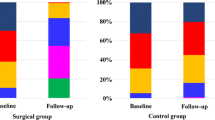Background: We evaluated the medium term changes in insulin sensitivity in morbidly obese patients with and without metabolic syndrome before and after Roux-en-Y gastric bypass (RYGBP) with silastic ring (Capella-Fobi). Methods: A longitudinal, clinical intervention study was conducted in 40 patients between 18 and 65 years old, with obesity class II and III (BMI ≥35-52 kg/m2), divided into 2 groups: no metabolic syndrome (NMS, n=21) and metabolic syndrome (MS, n=19). Anthropometric measurements, biochemical tests and classification of MS according to the NCEP criteria, were performed pre-operatively and at 3 and 6 months postoperatively. Results: In the preoperative period, 87% of the patients presented obesity class III (BMI 47±5 kg/m2) while 13% of the patients had obesity class II (37±2 kg/m2), and 19 patients (47.5%) presented MS. In the preoperative period, there were no differences among patients with MS and NMS in relation to the anthropometrics and body composition measurements. However, triglyceridemia, glycemia and insulinemia were higher in the MS group compared to the NMS group (P<0.05), although there was no difference in HOMA between the groups. HDL-cholesterol was lower in the MS group (p<0.05). In both postoperative study periods, all patients had significant reduction of anthropometric variables, body composition and biochemical variables. There were no differences between MS and NMS (p>0.05) groups. However, insulinemia decreased more in the postoperative period in the MS group compared to the NMS group (p<0.05). MS frequency in the MS group diminished to 26% after 3 postoperative months and no patient presented features of MS after 6 months postoperatively. Conclusions: Based on these observation: 1) patients of class II and III obesity present peripheral resistance to hyperinsulinemia without hyperglycemia; 2) RYGBP is able to reduce anthropometric measurements and body composition in a similar way for patients who have, or have not, MS; 3) there is rapid normalization of biochemistry of carbohydrates and lipids; 4) patients with previous MS lose the criteria needed for this diagnosis after 6 postoperative months.
Similar content being viewed by others
Author information
Authors and Affiliations
Rights and permissions
About this article
Cite this article
Coppini, L.Z., Bertevello, P.L., Gama-Rodrigues, J. et al. Changes in Insulin Sensitivity in Morbidly Obese Patients with or without Metabolic Syndrome after Gastric Bypass. OBES SURG 16, 1520–1525 (2006). https://doi.org/10.1381/096089206778870030
Published:
Issue Date:
DOI: https://doi.org/10.1381/096089206778870030




